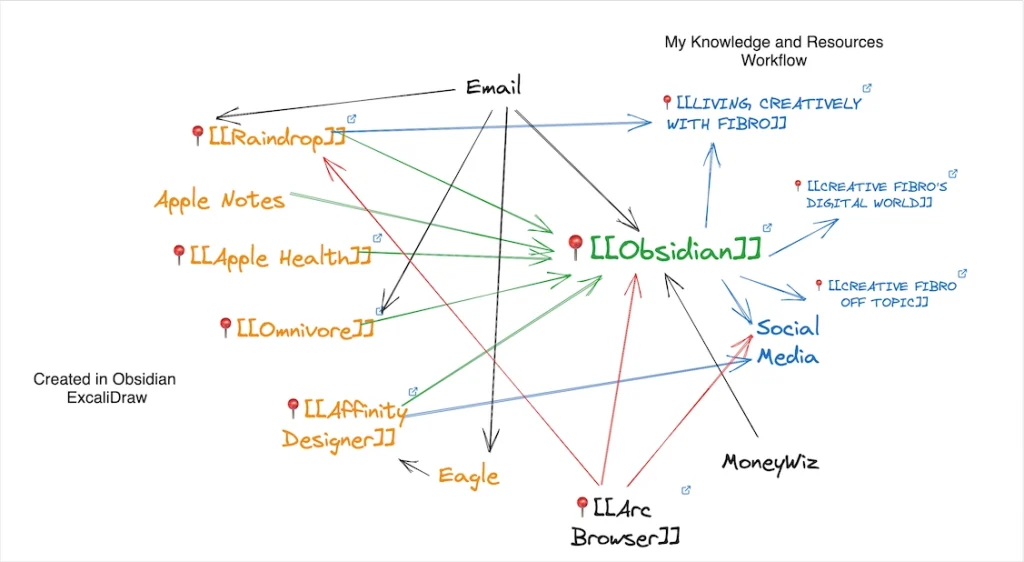In today’s fast-paced work environment, it is crucial to have an effective system for managing information and knowledge. Personal knowledge management (PKM) is a process that enables individuals to collect, organise, and share information that is relevant to their work.
- PKM in Business or the Workplace
- PKM for Students or Enthusiasts
- Personal Knowledge Management for the Digital era
- Types of tools that can assist with PKM
- PKM Influencers
- Ideas for your Knowledge Stack
- Learn from my mistakes
- Finding my Flow in Obsidian
- The Digital World surrounding Obsidian
- Investingating apps
- In Conclusion
It involves developing strategies and tools for acquiring, retaining, and utilising knowledge to improve personal and organisational performance. PKM is an essential skill for professionals in all industries, as it helps them stay informed, make better decisions, and achieve their goals more efficiently.
PKM in Business or the Workplace
In this blog post, I will explore the concept of personal knowledge management in detail and discuss its importance in the workplace. I will look at the different elements of PKM, such as information gathering, organising, and sharing, and provide practical tips on how to develop a personalised PKM system.
I will also discuss the benefits of PKM, including increased productivity, better decision-making, and a competitive advantage in the job market. Whether you are a freelancer, entrepreneur or a drowning employee. I wish I was familiar with PKM in my last employment.
PKM for Students or Enthusiasts
If you are a student or just have a personal interest in the subject, this post should have something for you too. The art of PKM can improve your process of acquiring, organising, and sharing knowledge, in a manner that can enhance your personal productivity and growth, as well as develop skills and strategies for applying that knowledge to real-world scenarios.

Personal Knowledge Management for the Digital era
Personal knowledge management (PKM) is becoming increasingly important in today’s digital age. With endless amounts of information available at our fingertips, it can be overwhelming to keep track of everything we come across.
Do you have an email inbox full of messages you thought you may just need again? Have you got an abundance of browser bookmarks gathered over a period of years? Do you have Facebook friends or follow people on the platform formerly known as Twitter, and can’t quite remember why they are there. Then PKM os for you.
PKM provides a set of strategies and tools to help you manage your information overload and increase your productivity. By organising and categorising information, you can quickly access the data you need and filter out irrelevant information.
PKM also promotes lifelong learning and skill development, as you are encouraged to continuously seek out new information and reflect on your own knowledge and experiences. In short, PKM is essential for anyone who wants to stay informed, productive, and competitive in today’s fast-paced world.
Types of tools that can assist with PKM
- Note Taking Applications
- Project and Task Management Tools
- Mind Mapping Software
- Creative Inspiration Galleries
- Health Trackers
- Financial Management Apps
- Social Influence networking
- Knowledge Databases
Why so many tools I hear you ask, the reason is that the most important letter in the PKM acronym is the P. It is personal. So a system that works well for one person may be next to useless for another.
PKM Influencers
There are many people on the Internet who current lead the conversation around the subject. Be it bloggers, YouTubers, Authors or often a mixture of them all. Some of the people I have taken influence from as I develop my system include but are not limited to:
- Tiago Forte at Forte Labs – The author of Building a Second Brain
- August Bradley’s Notion Life Design YouTube Series
- Bryan Jenks YouTube channel
- Nick Milo’s Linking Your Thinking Youtube Channel
- Danny Hatcher’s YouTube videos on Obsidian
- Zsolt’s Visual PKM on Youtube
Ideas for your Knowledge Stack
Remember the key detail is that your PKM stack, that is the series of tools you use, needs to make sense to you. What types of information do you want to capture? Do you like to see clean tables of facts or prefer a more visual approach?
Learn from my mistakes
Building with Notion
When I first came across the idea of “Building a Second Brain” I saw it visualised in August Bradley’s Notion system of Pillar’s Pipeline’s and Vaults. I though it looked amazing. I wanted to keep lots of facts, I produced content for a blog and needed to keep track of that. His system seemed amazing. So I spent over a week building it out exactly as instructed. It was brilliant and I utilised it religiously every day for maybe two weeks, then I didn’t. It simply didn’t work for me, we didn’t gel, it wasn’t me or the system at fault.
First time Obsidian
I then came across Obsidian via Bryan Jenks and was attracted to the graph view. He was giving away a demo of his vault and this looked like a brilliant place to start so I downloaded it and tried using it but once again it wasn’t right for me. Obsidian felt right though just not this was of tagging things, and I didn’t need the same level of academic paper research.
Along came Nick
When I discovered Nick’s Linking your Thinking Vault that he was kindly giving away, you can feel it coming can’t you… Yup I downloaded it and sort of amalgamated it with the beginning of my vault and became swamped, even though I loved so much about it.
Finding my Flow in Obsidian
Obsidian had remained at the heart of my system because I have used if for 932 days at the time of originally writing this. I have a little gizmo on the front page that tells me that, I don’t have some weird obsession. I love the tool because it is so flexible, it can give a very different experience depending who is using it. There is also an amazing community who help create plugins for it and support each other in tweaking their setup.
Only taking the useful
Now when I see a video and I’m inspired I always thinking about what I already have, will this make things better? For instance when I saw Danny Hatcher’s Movie Library, I was inspired. I already have Movie and TV Series folders of notes, but my Dataview Query is nowhere near as nice to use as this looks, so it is on my todo list to develop a Movie Canvas and the same goes for the book one.
The Digital World surrounding Obsidian
Another big revelation I have had is that although one tool can be the apex of your system, it needs to have a network of support. It can’t do everything. Thankfully there are tools like hookmarks that enable you to connect applications to each other and flow where the data does. This is my stack.

Excalidraw
This image actually demonstrates one of the plugins within Obsidian. You can sketch out diagrams or oven basic drawings. The system has an intelligent layer working on top, all the names with brackets around them look like that and have the pin next to them because they are links to notes. So it I was to click on the word Obsidian I would be taken to the note by the same name. Clever right.
Of course this isn’t all the software I use there are many other tools that do small jobs related to PKM and of course tools that are for other purposes too, but these are some of the tools I use pretty much daily.
Investingating apps
As well as talking about Personal Knowledge Management I also talk about Apps on this blog and will cover specific methodologies and alternative apps you can use instead in more detail in weeks to come. Although notion and Obsidian are big names in the PKM arena right now, there are many other alternatives and I have stied a few of them and will review then all
In Conclusion
In conclusion, personal knowledge management is the process of managing and organising your own knowledge to achieve personal and professional goals. It is important because it helps you become more efficient, effective, and productive in your work and personal life. By implementing strategies such as creating a knowledge inventory, setting goals, and using technology tools to manage information, you can take control of your own learning and development. Overall, personal knowledge management is a valuable practice for anyone looking to improve their skills, increase their knowledge, and achieve their goals.




0 Comments